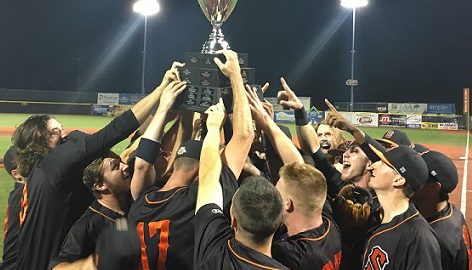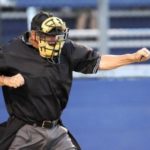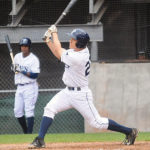The longest running independent baseball league is the Frontier League, and its 25th season concluded Saturday.
The Schaumburg Boomers(66-30) became the first team in the Frontier League to garner its third title(2013,2014). They defeated the opposing Florence Freedom(61-35) in four games in a best-of-five series that began Tuesday. Many in the industry had expected Schaumburg to win it all with excellent hitting and pitching.
In fact, Schaumburg was second in the Frontier League in Weighted On-Base Average(wOBA) with a .345 clip, 21 points above league average. Also, Schaumburg was first in the league in Opponent’s wOBA allowing only a .300 clip, 24 points better than league average, shown by the graph below.
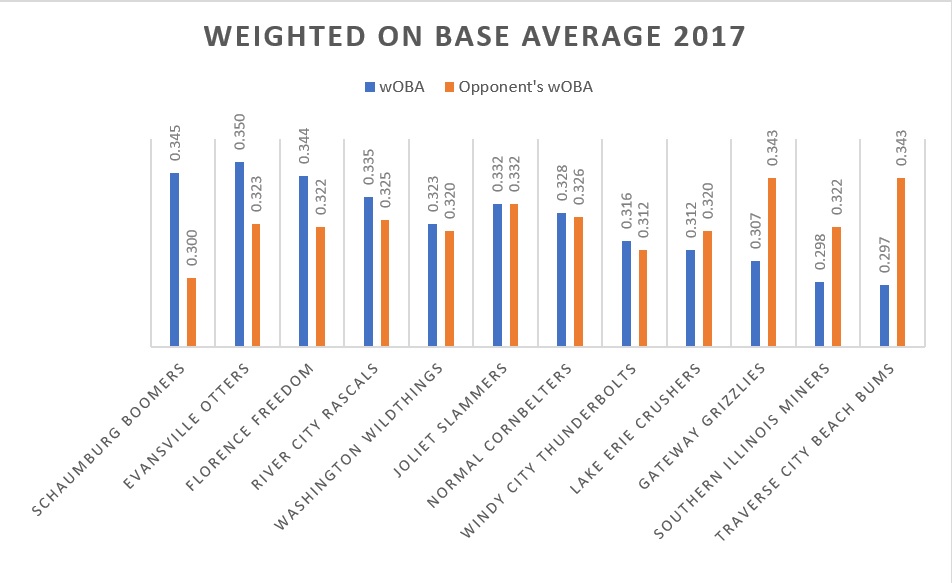
The Boomers were not playing to be better than average, they were playing to be one of the best.
Just two wins shy of tying a Frontier League record, the Boomers were a step above the rest of the league, but unlike the Major Leagues, the Frontier League endures a lot of roster turnover.
The highly talented players usually do not last long in the league, as a player’s given talent will be noticed by Major League Clubs. Schaumburg had a few of those players along the way.
On June 19th, pitcher Gunnar Kines was sold to the New York Mets after posting a .259 opponent’s wOBA(best in the league at that time).
On July 3rd, pitcher Alec Kenilvort was sold to the Milwaukee Brewers after posting a .251 opponent’s wOBA(2nd best among relievers at that time).
On July 19th, infielder Seth Spivey was sold to the Arizona Diamondbacks after posting a .505 wOBA(leading the league at that time and was a front runner for the Triple Crown).
Three key cogs to the Boomer’s success would surely hinder their performance, right?
Not necessarily.
David Harris only appeared in 76 games with the Boomers, yet he was the MVP of the league with the league-leading .410 wOBA.
Since June 19th, the Boomers signed 6 players that played a pivotal role in the regular season and post season.
On July 3rd, the Boomers signed pitchers Kit Fowler and Michael Wood.
Fowler in the regular season allowed only a .244 wOBA in 12 appearances(2nd best since July 4 through the end of the regular season) and allowed a .377 wOBA in the postseason.
Wood in the regular season allowed a .341 wOBA in 15 appearances, and allowed a .282 wOBA in four and two-thirds innings in the series-clinching game against Florence.
On July 21st, the Boomers signed infielder Andrew Brodbeck.
Brodbeck in the regular season posted a .336 wOBA, 12 points above league average. In the postseason, Brodbeck was even better, posting a .374 wOBA in 19 plate appearances.
On July 24th, the Boomers signed infielder John Holland.
Holland posted a .350 wOBA in 151 plate appearances in the regular season, 26 points better than league average. In the postseason, Holland posted just a .238 wOBA in 40 plate appearances.
On July 25th, the Boomers signed pitcher Joe Hauser.
Hauser, in 9 appearances, allowed just a .265 wOBA in the regular season(3rd best since his signing). Hauser was even better in the postseason, allowing a .262 wOBA in 2 starts(one of those being a complete game).
On August 4th, the Boomers signed infielder Rock Shoulders.
Shoulders, a high power, low average player, proved he could provide value with overall offense with a .368 wOBA(2nd best among first baseman since his signing). In the postseason, he was still effective, posting a .353 wOBA.
The Boomers lost key pieces, yet they were able to implement the “next man up” strategy. Taking a look at run differential, the Boomers are astoundingly better than anyone else.
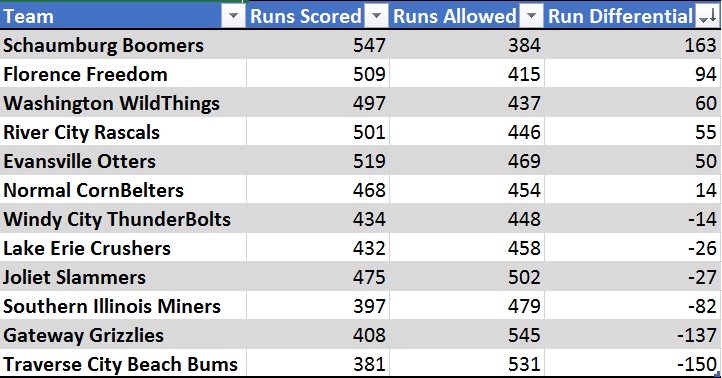
The Schaumburg Boomers were 69 points better than the next best team in run differential, which was their opponent, the Florence Freedom. Of the last 5 Frontier League winners, the next highest team in run differential was +131 by, you guessed it, the Schaumburg Boomers in 2014. No other champion was above +100 in run differential.
The Boomers capped off one of the Frontier League’s most historic seasons led by Jamie Bennett, and their roster throughout the entire season was one of the deepest in all of professional baseball.

